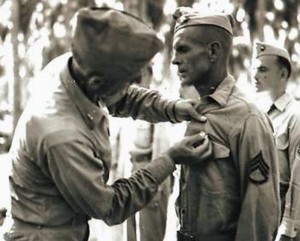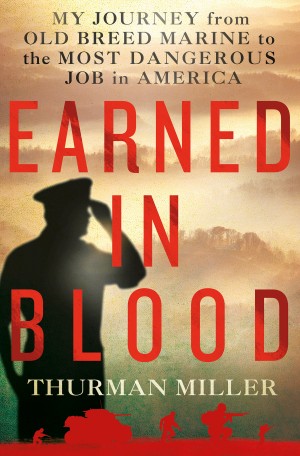
WCAG Heading
WCAG Heading
WCAG Heading
By Thurman Miller
Some men go to war only because they’re ordered to under penalty of imprisonment, others because their love of country outranks their sense of self-preservation.
During my time in the Marine Corps, I came to know a few who were born soldiers, who thrived on the sense of order and family the Corps provided. Sergeant Elmo “Pop” Haney was one such man.
If he’d not been real, Haney would have made an irresistible fictional character. As is, he has been featured in several books about Guadalcanal, New Britain and Peleliu, as well as HBO’s The Pacific miniseries. He was a Fifth Marine veteran who’d served in France—and at the infamous Belleau Wood—and kept returning for more. After World War I, he was discharged from the Marines and reportedly tried teaching school and selling vacuum cleaners back in Arkansas—both occupations I have difficulty picturing him in—before reenlisting in his old outfit.
I first got to know him during our division’s training in Cuba in 1940. I was a private when we met. Had I known he was a World War I Marine I would have saluted him, whatever his rank.
He was our Platoon Sergeant in Cuba and would stay with our K Company, Third Battalion, Fifth Marines (K-3-5) through Guadalcanal and then Cape Gloucester, and we all respected the “old man.” My first impression was how very GI he was. He never addressed anyone by their name but by their rank. He would, without orders, “Blanco” his gear with a khaki powder, which when mixed with water and coated on gear, would color it uniformly and form a protective coating, as he’d learned to do in World War I. He cleaned his gun constantly, and kept his body as clean as conditions permitted, scrubbing himself all over with a stiff-bristled brush. Marcus Brotherton writes in Brotherhood of Heroes that Pop would round off his morning with a “rigorous bayonet drill with Pop as its only participant” and was reported to have given himself extra police duty because he dropped a cigarette butt on the ground. Although he held the rank of gunnery sergeant, for much of his service he didn’t have an official position in our company’s ranks, instead acting a troubleshooter and a guide for the younger marines, “correcting mistakes and helping out” as E.B. Sledge put it.
Writing about Haney’s service with us on Cape Gloucester, New Britain, Collier’s magazine described him as then “past 46, a leathery little man, a stickler for discipline, as rigid as a ramrod, a man who knows the book backward….a sun-dried little man…as hard as hobnails, with more battles under his belt than most Marines have years of service.” His readiness to kill was unquestionable and his dedication to keeping his men prepared unwavering. Pop would win a Silver Star for his service on the Cape Gloucester. By that campaign he was pushing fifty, and he said the Cape was the worst conditions he’d ever fought in; but he didn’t know what lay in store.
Near the end of my time fighting on the Cape, I had plenty of points to rotate stateside. Captain Andrew Haldane called me in and got right to the point. “T.I., I will make you Top Sergeant if you stay for Peleliu.” I had great respect for Haldane and was honored he would ask me, and especially honored by his confidence in me. He already knew the next island the Division was to take. But lately I had been troubled by the thought that my luck was running out. Haldane and I had always gotten along well, so I called him by his code name. “Close Crop, you keep your Top Sergeant stripes. I’m going home.” (He would only come to be called “Ack Ack” for Peleliu.) I returned to Camp Lejeuene to teach future officers.
Unlike me, Haney stayed on in the South Pacific and went on to fight, briefly, at Peleliu. Only two days into that battle, he’d had enough of war, and asked to be sent home. The Corps complied; he’d done his duty and much more.
We saw terrible fighting on Guadalcanal, and even worse on Cape Gloucester, but it was battle. On Peleliu, by contrast, the Japanese were so deeply entrenched in caves carved from the volcanic rock that the operation became a matter of burning them out one by one. But maybe he felt his luck had run out too; it’s funny how men at war develop such instincts.
I always wondered what became of him, and how he ordered his life once he was past the age of combat. Was he lost without that structure? Did he carry over the lessons of his military life to his civilian days?
He retired from the Corps a Master Sergeant and returned to his native Arkansas, and I always felt that when he walked off the battlefield at Peleliu he took a way of military life with him. Sledge wrote of Haney, “I felt that he was not a man born of woman, but that God had issued him to the Marine Corps.” I agree, as we learned a lot from him.
Haney lived to be 80 years old and his obituary scarcely does justice to the gift he made to his country of his youth and military readiness. His death notice is very short, mentioning his Silver Star and that he graduated from Chilicothe Business College. The only other event it thought worthy to mention is that his “military unit was the first military unit to participate in baseball in Japan.” I can’t recall ever seeing Pop laugh, but maybe, finally, somewhere he would crack a smile that his legacy could be summarized so briefly.
Portions of this article include excerpts from the book Earned in Blood: My Journey from Old-Breed Marine to the Most Dangerous Job in America.
Copyright 2013 by Thurman Miller.
Reprinted with permission from St. Martin’s Press.
THURMAN MILLER served as Gunny Sergeant with the First Marine Division in World War II and was one of the first Marines ashore on Guadalcanal. He fought in several other historic South Pacific battles, including New Britain, and after the war worked in the coal mining industry for over three decades. He formerly served as president of the West Virginia Chapter of the First Marine Division and is the author of Earned in Blood: My Journey from Old-Breed Marine to the Most Dangerous Job in America.

